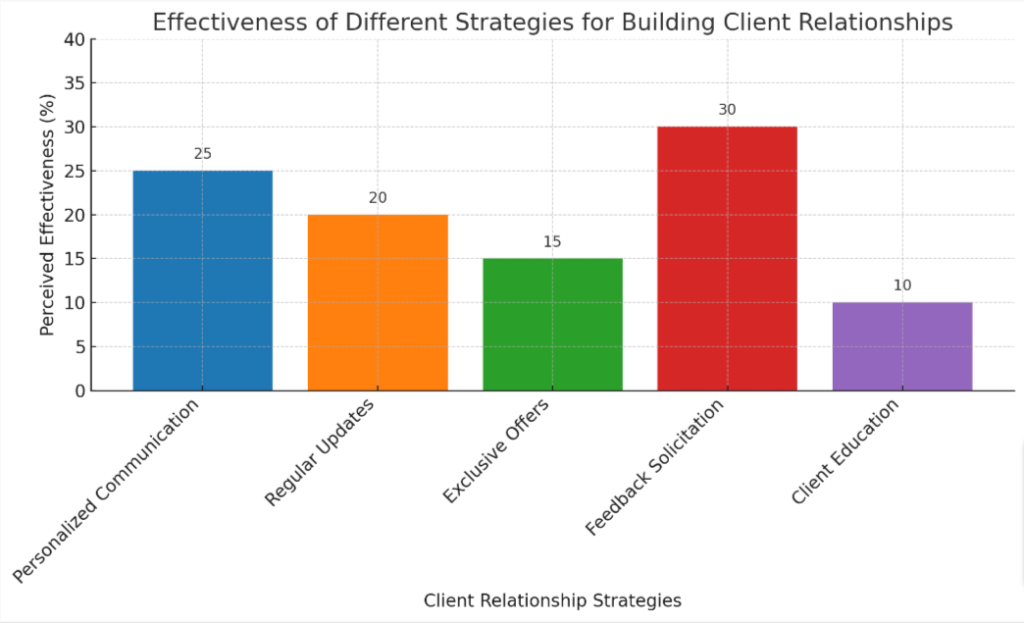Cultivating Client Connections: A Writer’s Guide
Navigating the world of freelance writing can be challenging, particularly when it comes to building enduring client relationships. Studies show that businesses with strong customer relationships are 60% more profitable than those without.
This blog post seeks to guide you through mastering your network as a writer and fostering lasting connections with clients. Intrigued? Read on!
Key Takeaways
- Building lasting client relationships is crucial for writers as it allows them to gather important information about their clients and internalize it to better understand their needs and goals.
- Going above and beyond with proposals by customizing suggestions, offering unique perspectives, and showcasing innovative strategies can help writers secure strong freelance or ghostwriting relationships.
- Implementing an onboarding process that includes welcome emails, introductions, project overviews, communication preferences, collaboration tools, expectations alignment, payment terms discussions, client-specific information gathering, milestones and check-ins, and follow-up communications can help writers build strong client relationships from the start.
Importance of Building Lasting Client Relationships
Building lasting client relationships is crucial for writers as it allows them to gather both “hard” and “soft” information, internalize it, go above and beyond with proposals, have an onboarding process, and treat clients as partners.
Gather both “hard” and “soft” information
Understanding your clients goes beyond knowing their names and business profiles. The process of building lasting relationships requires you to gather both “hard” and “soft” information about them.
Hard information pertains to data, facts, and figures accessible from websites or other resources. On the flip side, soft information includes personal details like hobbies, family life or events they care about.
This type of data helps paint a more complete picture of who your client is as an individual—not just a business entity—allowing for deeper connections over shared interests or values.
Constantly update this knowledge base; it’s not meant to be static but should evolve as the relationship with your client does.
Internalize information
Internalizing information goes beyond basic data collection. It involves truly understanding and appreciating the needs, goals, and values of your clients. In this stage of building lasting relationships with clients as a freelance writer, you engage in active listening to comprehend expectations fully.
Absorbing vital details about your client’s brand allows room for creativity in writing tasks. Connecting with the essence of their work fosters trust-building and paves the way for effective communication.
Client loyalty is often solidified once they realize that you not only listen but also internalize their guidelines and philosophies before drafting even a single line.
Go above and beyond with proposals
Creating exceptional proposals is a critical step in securing strong freelance or ghostwriting relationships. Proposals are more than just pricing and timelines; they’re an opportunity to demonstrate your commitment, understanding of the client’s needs, and creative approach.
Don’t merely offer what’s expected, strive for the extra mile. Use insights from prior meetings to customize your suggestions uniquely to their project requirements. Show them you’ve taken time to deeply understand their business by drilling down into specifics like industry trends or competitor analysis that could impact their project success.

Fascinate them with unique perspectives and innovative strategies you can bring on board, making it hard for them not just to consider but accept your proposal enthusiastically. This way, your network-building endeavors move beyond initial attraction towards lasting satisfaction and loyalty among clients.
Have an onboarding process
Implementing an onboarding process helps writers build strong client relationships by providing a smooth transition into working together. Here are key steps for an effective onboarding process:
- Welcome email: Send a personalized welcome email to new clients, expressing excitement about working together.
- Introductions: Introduce yourself and team members, if applicable, through email or video call. Provide brief backgrounds and highlight relevant experience.
- Project overview: Clearly outline the project scope, deliverables, deadlines, and any important details in a professional yet approachable manner.
- Communication preferences: Discuss preferred modes of communication (email, phone calls, video chats) and availability during the project duration.
- Collaboration tools: Determine which collaboration tools will be used for sharing files, tracking progress, and facilitating communication (e.g., Google Drive, Trello).
- Expectations alignment: Clearly define expectations regarding revisions, feedback turnaround time, payment terms, and other project-specific requirements.
- Payment terms: Discuss invoicing procedures and payment schedules to avoid any potential misunderstandings.
- Client-specific information gathering: Collect necessary client information such as brand guidelines, target audience details, project-specific resources/materials.
- Milestones and check-ins: Establish milestones throughout the project timeline to track progress and conduct regular check-ins to address any concerns or clarifications early on.
- Follow-up communication: After each milestone or completed task, provide updates on progress made along with an opportunity for clients to provide feedback.
Treat clients as partners
When building lasting client relationships, it is crucial to treat clients as partners. By viewing clients as equal partners in the process, writers can foster mutual trust and collaboration.
This involves actively involving clients in decision-making and valuing their input throughout the project. When treating clients as partners, writers prioritize open communication and transparency, ensuring that both parties are aligned in their goals and expectations.
Building a partnership mindset creates a positive client experience, fosters loyalty, and encourages repeat business.
Strategies for Fostering Long-Lasting Relationships
Be proactive in your approach to client relationships, anticipating needs and addressing concerns before they arise.
Be proactive rather than reactive
Take control of your client relationships by being proactive instead of reactive. Rather than just responding to issues as they arise, anticipate potential problems and take steps to prevent them.
This means actively seeking out feedback from clients, addressing concerns before they become major issues, and always staying one step ahead in communication. By taking a proactive approach, you’ll not only provide better service but also build trust and demonstrate your commitment to their success.
Be empathetic rather than defensive
Show empathy towards your clients instead of being defensive when addressing their concerns or issues. Put yourself in their shoes and try to understand their perspective. This approach will help you build stronger, more trusting relationships with your clients, as they will feel heard and valued.
Remember, being empathetic does not mean agreeing with everything they say, but rather demonstrating understanding and a willingness to find solutions together. By taking this approach, you can foster better communication and resolve any conflicts that may arise more effectively.
Establish structure for communication
Establishing a structure for communication is crucial in building lasting client relationships. This ensures that both parties are on the same page and can effectively collaborate. It also helps to streamline the communication process, avoid misunderstandings, and keep the project on track. Here are some steps to establish clear communication:
- Set regular check – in meetings or calls to discuss progress and address any concerns.
- Use project management tools or shared documents to keep all communication organized.
- Create a communication plan that outlines preferred methods of communication (email, phone, video conference) and response time expectations.
- Define roles and responsibilities for each party involved in the project.
- Be proactive in providing updates or seeking clarification when needed.
- Encourage open and honest feedback from clients throughout the process.

Share concerns early
Addressing concerns early on is crucial for building strong and lasting client relationships. By openly communicating any issues or challenges that may arise, writers can demonstrate their professionalism and commitment to finding solutions.
When problems are addressed promptly, it shows clients that their satisfaction is a top priority. Sharing concerns early also allows for open dialogue and collaboration, fostering trust and strengthening the overall relationship.
Ultimately, this proactive approach helps to ensure that both parties are on the same page, leading to smoother project execution and increased client satisfaction.
Embrace small talk
Engaging in small talk may seem insignificant, but it is a valuable tool for building lasting client relationships. By taking the time to engage in casual conversations with your clients, you can establish rapport and create a sense of connection.
Small talk shows that you are interested in them as individuals, not just business partners. It allows you to uncover common interests and shared experiences, which can further strengthen your relationship.
So don’t underestimate the power of small talk – embrace it as an opportunity to foster meaningful connections with your clients.
Maintaining Professionalism and Trust
Navigating client relations as a freelancer requires setting clear expectations, maintaining open and clear communication, handling challenging clients with professionalism, and collaborating to foster trust in the relationship.
Navigating client relations as a freelancer
Freelancers face the unique challenge of managing client relationships on their own. To navigate these relations successfully, it is essential to establish clear expectations from the beginning and communicate effectively throughout the project.
Maintaining professionalism and trust are key elements in building strong long-term connections with clients. Handling challenging clients with grace and collaboration will foster trust and loyalty for future collaborations.
By mastering these skills, freelancers can create a positive experience for clients while enhancing their own professional reputation.
Setting clear expectations
Setting clear expectations is crucial for building strong and lasting client relationships. When both parties have a clear understanding of what is expected, it helps to avoid misunderstandings and frustrations down the line.
By clearly outlining project timelines, deliverables, and any specific requirements or preferences, you can ensure that everyone is on the same page from the beginning. This not only helps to establish trust but also demonstrates your professionalism and commitment to delivering high-quality work.
Clear expectations also contribute to effective communication, as both you and your clients will have a shared understanding of what needs to be accomplished. Overall, setting clear expectations sets the foundation for a successful working relationship built on mutual respect and understanding.
Maintaining clear communication
Maintaining clear communication is crucial for fostering strong and lasting client relationships. By keeping the lines of communication open and transparent, writers can ensure that both parties are on the same page.
This means being responsive to emails and messages in a timely manner, providing regular project updates, and addressing any concerns or questions promptly. Clear communication also involves active listening, seeking clarification when needed, and avoiding misunderstandings by using concise language.
By prioritizing clear communication, writers can build trust with their clients and create a positive client experience that leads to long-term partnerships.
Handling challenging clients
Dealing with difficult clients can be a challenge, but it’s essential for writers to navigate these situations effectively. Here are some strategies to handle challenging clients:
- Address concerns promptly and directly.
- Stay calm and composed during interactions.
- Listen actively to understand their perspective.
- Offer solutions or alternative options.
- Set clear boundaries and manage expectations.
- Seek feedback to improve the working relationship.
- Maintain open and transparent communication.
- Take responsibility for mistakes and rectify them promptly.
- Focus on finding common ground and mutually beneficial outcomes.
Collaborating and fostering trust
Collaborating with clients and fostering trust is crucial for building lasting relationships as a writer. By working together closely, you can ensure that the final product meets their needs and expectations.
This involves active communication, listening to their feedback, and being open to making necessary revisions. Trust is built through transparency and honesty in your interactions, delivering on your promises, and consistently meeting deadlines.

When clients feel valued as partners in the writing process, it strengthens the relationship and encourages them to continue working with you in the future.
Conclusion: Cultivating Strong and Lasting Client Relationships
Cultivating strong and lasting client relationships is crucial for writers looking to succeed in the industry. By delivering on time, exceeding expectations, and establishing ongoing support, writers can unleash the power of solid client relationships.
Embracing diversity, practicing active listening, and prioritizing client satisfaction are key to building trust and loyalty. Ultimately, success in ghostwriting and attracting freelance clients comes through building strong partnerships based on effective communication and nurturing long-term connections.
Delivering on time and exceeding expectations
Delivering on time and exceeding expectations is crucial for building lasting client relationships. By consistently meeting deadlines and going above and beyond what is expected, writers can earn the trust and loyalty of their clients.
This means delivering high-quality work that not only meets the client’s needs but also exceeds their expectations. By doing so, writers demonstrate their professionalism, reliability, and dedication to providing excellent service.
Clients will appreciate the extra effort put into delivering on time and surpassing their expectations, leading to stronger relationships and potential referrals in the future.
Establishing ongoing support
Establishing ongoing support is crucial for building lasting client relationships as a writer. It involves consistently being there for your clients beyond just delivering the final product.
This means offering assistance, guidance, and valuable resources whenever they need it. By providing ongoing support, you demonstrate your commitment to their success and create a sense of trust and reliability that keeps them coming back to work with you again in the future.
Actively seek opportunities to provide ongoing support by staying connected, addressing any concerns or questions promptly, and offering additional services or recommendations that can further benefit your clients.
Unleashing the power of solid client relationships
Building strong client relationships is vital for writers seeking success in the industry. By fostering trust and open communication, writers can unleash the power of solid client relationships.
These relationships not only lead to repeat business but also pave the way for positive word-of-mouth referrals. To achieve this, writers must prioritize delivering high-quality work, maintaining clear and prompt communication, and going above and beyond to exceed client expectations.
By doing so, writers can cultivate strong partnerships that will benefit their careers in the long run.
Embracing diversity and practicing active listening
Embracing diversity is essential for writers who want to build lasting client relationships. By recognizing and respecting the unique perspectives and backgrounds of clients, writers can establish trust and foster a positive working environment.
Additionally, practicing active listening allows writers to truly understand clients’ needs and preferences, leading to more effective communication and ultimately better results. Embracing diversity and actively listening are key components of successful client relationships in the writing industry.
Success through strong relationships in ghostwriting.
Building strong relationships is crucial for success in ghostwriting. By establishing a solid rapport with your clients, you can create an atmosphere of trust and collaboration that leads to exceptional results.
It’s important to communicate effectively, respond promptly to feedback, and understand the unique needs of each client. By fostering strong relationships in ghostwriting, you’ll not only enhance client satisfaction but also increase your chances of repeat business and referrals.
With dedication and a focus on building lasting connections, you can achieve great success as a ghostwriter.

